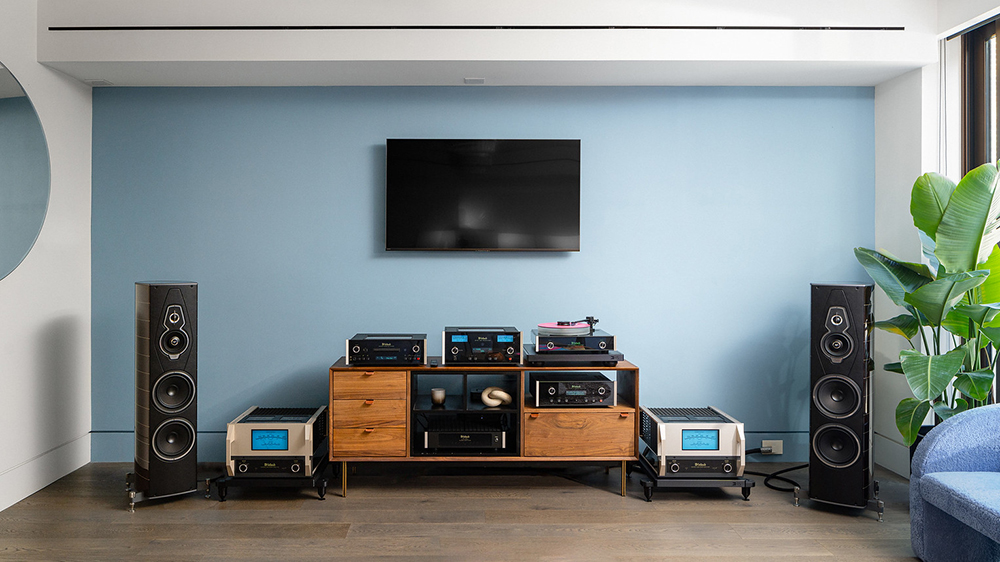Bose and McIntosh Group: why I'm positive about the acquisition
Guys, why all the doom and gloom?

If you’ve spent the past 24 hours hiding under a rock, newsflash: Bose Corporation announced it was acquiring McIntosh Group, the parent company of luxury audio brands McIntosh, Sonus Faber and Sumiko Phono Cartridges and the Fine Sounds distributor. The deal sees Bose take on McIntosh Group ownership from the American private equity firm, which only acquired the group in 2022 for an undisclosed fee, and expands Bose’s consumer audio portfolio, launching it into the high-end audiophile game for the first time.
It’s pretty big news in the audio world and is reminiscent, you could say, of Samsung’s acquisition of Harman in 2016. And understandably our readers have plenty to say about it, with the majority of comments on our related Facebook post pretty negative about the whole thing – ‘RIP McIntosh’, ‘BoseIntosh is born’ and the like. ‘The world is ending’ was the most thespian of them all and, would you believe, actually appeared more than once. (My personal favourite: 'I always wanted a set of Sonus Faber 901s.')
Each to their own, and I do somewhat understand those reactions (well, the milder ones!); people tend to fear a brand identity crisis and/or a potentially negative influence a mass-market audio brand could have on revered hi-fi brands they know and love. It’s perhaps only human nature to feel a little cynical about these two very different audio worlds colliding in such a way. After all, Bose isn’t exactly adored by the wider audiophile industry, which has long had the jab “No highs, no lows, it must be Bose!”. It's understandable that some people may fear the impact of the Bose acquisition on such an iconic brand's products.
However, no one yet knows how this particular chapter for McIntosh Group will play out, so might we look at the potential positives instead?
Deep pockets and passion
Firstly, McIntosh Group has been owned by investment firms for many years now. Isn’t ownership by an audio brand a much better fit? Especially by a company that is naturally passionate about audio, and has been for 60 years, and one that appears to have deep pockets. In the past three years, Bose has reportedly generated an annual revenue between $3bn and $3.2bn. Bose isn’t going anywhere – it’s established, reputable and likely to be in this for the long game.
I'm confident that this ownership will last longer than the previous one – and that the new owners are likely far more interested in growing the brands rather than simply turning a quick profit.
The luxury audio market is growing and Bose has seen an opportunity to be a part of that growth. (Either that or it just really wanted its Christmas party to be on that €10 million super yacht McIntosh and Sonus Faber kitted out.) If it can invest in the MG brands and give them the R&D budget to innovate, then happy days – the group's American electronics and Italian speaker hero brands could continue to thrive.
Get the What Hi-Fi? Newsletter
The latest hi-fi, home cinema and tech news, reviews, buying advice and deals, direct to your inbox.
That jives with comments by Bose CEO Lila Snyder, who said: “We look forward to honouring the heritage of these brands, investing in their future and pushing the boundaries of audio innovation... Together the brands will imagine what’s possible in the future of audio – delivering new products, bespoke offerings and unparalleled listening experiences for music lovers around the globe.”
In an interview with CNBC, Snyder didn’t rule out the possibility of Bose producing McIntosh-branded headphones, which is probably the easiest ‘new product’ to envisage coming out of this tie-up considering Bose’s vigour in the headphones space and that glaring gap in McIntosh’s prolific product catalogue. McIntosh sound alongside Bose active noise cancellation technology – what’s not to like?
Staying in their lane
This acquisition will of course allow Bose unprecedented access to true high-end audio expertise from two of the best brands in the business, and such learnings could trickle down to Bose’s premium lifestyle products. That’s potentially a great consequence for the more casual audio consumer.
Whether the brand will stay in its premium audio lane and allow the likes of McIntosh and Sonus Faber to remain – and flourish – in their distinctly separate ‘luxury’ one, is yet to be seen. Fingers crossed.
One of the Facebook comments suggested that ‘it will be the era of the amps before Bose took over and the amps after’ – but I can’t see Bose muscling in on the brands’ established specialist teams where product development and engineering is concerned. And it’s hardly going to demand its $300 headphones take up real estate in MG’s exclusively kitted-out House of Sound showcasing townhouse in New York, right?
The Bose press release states that "McIntosh and Sonus Faber will maintain its focus on amplifiers, loudspeakers, turntables, and other high-end products" and Snyder told CNBC that McIntosh will continue to manufacture out of its longtime headquarters in Binghamton, New York. So it’s not all change (for now anyway).
Automotiv-ation
You only have to read until paragraph four of the Bose press release to get to one of the acquisition’s clearest intentions – to capitalise on and enhance McIntosh's burgeoning in-car audio solutions and partnerships. It reads: "The combined forces of Bose and McIntosh Group also opens new opportunities in the automotive sector. By leveraging Bose’s 40-plus years of experience in automotive audio, and McIntosh Group’s legacy of performance and design, the brands will work together to expand their research and continue to engineer authentic in-car experiences that redefine automotive sound."
Given McIntosh’s experience in developing in-car entertainment systems for various Jeep Wagoneer and Grand Cherokee models, and Sonus Faber’s with the Maserati Grecale, Lamborghini Revuelto and Pagani Huayra, it's easy to understand why Bose would want in on that lucrative luxury car market. Bose already has sound systems for ‘small cars, high-performance vehicles, and ultra-luxury automobiles’ and automotive partners such as Porsche, Chevrolet, Honda and Mazda.
Despite the two McIntosh Group brands' aforementioned super yacht dalliance, presumably a Bose-branded dreamboat isn't in the plans too... for now, anyway!
We can only wait and see what developments will occur after this acquisition, although we imagine it will be a while until we see any collaborative products – but it's an intriguing prospect that we hope will benefit all brands' respective identities.
MORE:
McIntosh and Sonus Faber presidents talk COVID-19 impact, brand DNA, and the return to automotive
These are the best Bose headphones you can buy
McIntosh's House of Sound NYC townhouse is the AV pad of our dreams
Becky is the managing editor of What Hi-Fi? and, since her recent move to Melbourne, also the editor of the brand's sister magazines Down Under – Australian Hi-Fi and Audio Esoterica. During her 11+ years in the hi-fi industry, she has reviewed all manner of audio gear, from budget amplifiers to high-end speakers, and particularly specialises in headphones and head-fi devices. In her spare time, Becky can often be found running, watching Liverpool FC and horror movies, and hunting for gluten-free cake.
-
F8lee I get the feeling this is really only about garnering more revenue, taking advantage of the McIntosh brand while it is still revered. I mean, for all their zillion dollar components, it seems to me they sold themselves out when they aligned with car manufactureres - after all, how fantastical can a sound system be in a car where road and wind noise are consstantly in the background? It's a status thing more than a real difference in audio quality, I think.Reply

